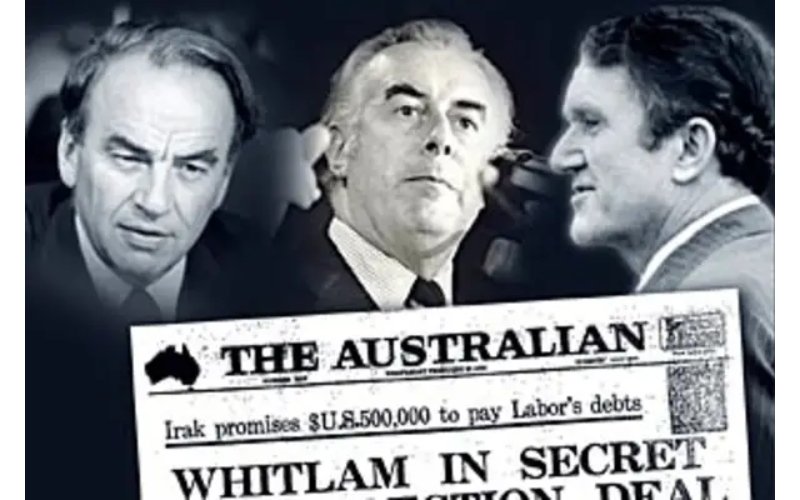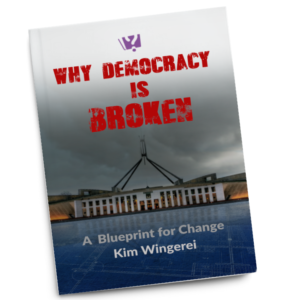Click play for Podcast.
Media is failing in it’s role – but succeeding at manufacturing consent in Australia – and (almost) everyone is complicit.
Manufacturing Consent in Australia
As the depression hit Australia in the early thirties, a number of business people known only as “the Group” plotted and schemed to get their man – then Postmaster General Joseph Lyons – to defect from the Labor party and resign his ministerial position. A few months later Lyons was instrumental in forming the United Australia Party (UAP) which won the 1931 election in a landslide. The UAP was the precursor to the Liberal Party as we now know it, formed in 1945.
One of the (allegedly) more peripheral members of “the Group” was Keith Murdoch – father of Rupert and Managing Director of the Herald Weekly Times group of newspapers – along with a coterie of wealthy and influential men. Their main objective was to stop the Government from implementing “New Deal” style economic policies to Australia which they feared would diminish their wealth. Robert Menzies, then Australia’s youngest King’s Council was also a member.
 Although much of “the Group’s” work was shrouded in the cigar smoke of Melbourne’s Savage Club, Murdoch later made no secret of what historian Humphrey McQueen calls “a conspiracy, if the English language is to retain meaning”. Murdoch was quoted a few years later declaring “I put him there, and I’ll pull him out”. As he later attempted to do before Lyons beat him to it and died.
Although much of “the Group’s” work was shrouded in the cigar smoke of Melbourne’s Savage Club, Murdoch later made no secret of what historian Humphrey McQueen calls “a conspiracy, if the English language is to retain meaning”. Murdoch was quoted a few years later declaring “I put him there, and I’ll pull him out”. As he later attempted to do before Lyons beat him to it and died.
This, and many other similar incidents is described in academic Sally Young’s fascinating and very well researched “Paper Emperors – The Rise of Australia’s Newspaper Empires”.
Young’s book finishes with the end of World War II, but Keith Murdoch and the other press barons – including the Packers, Syme’s (owners of The Age) and Fairfax families continued to wield enormous influence over Australian politics through their media interests. Culminating in Keith’s son Rupert helping first to make and then break the Whitlam Government, working furiously behind the scenes leading up to the infamous dismissal in ‘75.
Today, the media landscape is much different, much more diverse, less profitable but ownership even more concentrated.
Although radio had started to come into its own in the thirties, and television a few decades later, the newspapers and their proprietors have continued to rule the roost when it comes to political influence.
Radio – and in particular the ABC – was seen as a threat to the newspapers and they did their utmost to variously limit its proliferation or control it. But their fears were unfounded, just as it was with the advent of television a couple of decades later.
The newspapers continued as the main source of news. But as television invaded our living rooms the way we consumed news changed to become more entertainment than information. Television mimicked the tabloids more than the more serious broadsheets, with the focus of bite-sized chunks easily consumed and designed to attract eyeballs for advertisers to exploit.
Slowly, but surely, even the broadsheets had to change to what they are today – mostly purveyors of infotainment thus competing in a much wider field with profits declining.
Then along came the internet and social media to disrupt not just the way media was consumed and removing the classifieds “rivers of gold” from the papers further eroding profits, but introducing an altogether different kind of owner – the young mega billionaires with their borderless empires.
And although Rupert Murdoch continues to wield influence in Australia, his economic interests are now mainly elsewhere and the heir apparent Lachlan Murdoch has so far displayed little of his father’s skills, nor the insatiable, raw ambition of his forebears – the third generation rarely does.
Today the media influence over politics take many more and quite different forms, obvious to observe yet more covert, more sinister and far more difficult to combat or regulate.
Over 30 years ago Noam Chomsky and Edward Herman published “Manufacturing Consent: The Political Economy of the Mass Media” in which they outlined how mass media is anything but independent.
In much detail Chomsky and Herman identify the five factors that contribute to how media – “the fourth pillar of democracy” – are geared towards manufacturing consent in the populace to support a sanitised narrative, much more than its intended role of holding government and corporate power to account.
They pointed out how the combination of profit orientated ownership, the dependence on advertisers and the manipulation of how news is disseminated by the coalition of business and government, creates an environment that actively denies and suppresses stories contrary to the vested interests.
Furthermore, in ways eerily reminiscent of the modus operandi of dictatorial governments throughout history, modern mass media is a dysfunctional ecosystem that all too readily embraces the common enemy as a means of uniting the masses – whether it be Jews, coloured people, communism, terrorists, Islam or drugs – just to name a few.
In an interview with Al Jazeera on the thirtieth anniversary of the book’s publication last year, Chomsky points to social media as having the potential of being a saviour for the free flow of news and information, because they are not creators but mere distributors of content.
Social media – and Google – are, however equally dependent on advertisers, and their practice of selling user meta-data to anyone prepared to pay – including political parties – is another worrying threat to media independence.
And as we have seen from Donald Trump and here at home in the recent Federal Election, politicians are getting not just better at the game of manufacturing consent, but also less inconspicuous about it – often no longer even bothering to hide their half-truths and lies.
Politicians, too, are ingrained in a system that is inherently and increasingly resistant to change, or specifically any change that threatens the interests of corporations (donors) and the operations of Government.
And although they remain a stalwart of assumed independence, “our” ABC is increasingly drawn into the same vortex of co-dependence and fear of change.
The Murdochs of the world no longer need clandestine meetings in men-only private clubs to wield their influence. We live in a world where the powers that be all exists in a self-perpetuating system of recalcitrance.
In some ways the Labor Party in Australia has never quite recovered from Joseph Lyons’ defection in 1931. Just like Labor movements and more progressive crusader all over the world, their inability to influence and control mass media remains a limiting factor in their ability to be heard.
Next – media diversity – threat or opportunity?





